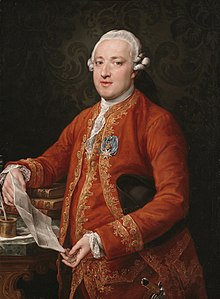José Moñino y Redondo

José Moñino y Redondo , Count (Spanish: conde) of Floridablanca (born October 21, 1728 in Murcia , † December 28 or December 30, 1808 in Seville ), was a Spanish lawyer and statesman who was under the kings of Charles III. and Charles IV was Prime Minister of his country.
Life
Youth and education

José Moñino was born in Murcia, the son of a lawyer. He attended school in his hometown and then studied law at the University of Salamanca . At first he practiced as a lawyer together with his father.
Political career
On behalf of Leopoldo de Gregorio , Marqués de Esquilache , he successfully represented the interests of the crown in some cases. In 1766 he was appointed Fiscal (Prosecutor) of Castile .
In 1767, Charles III. the powerful Jesuit order in Spain and its colonies. The Jesuits' goods were confiscated and the friars had to leave Spanish territory. In 1772 the court sent José Moñino as ambassador to the Holy See in Rome to promote the dissolution of the order and to know the actions of the Spanish crown in harmony with the interests of the curia . He fulfilled this mission in the spirit of his clients (→ repeal of the Jesuit order by Pope Clement XIV. ); In 1773 he was given the title of Count of Floridablanca as recognition .
Term of office as Prime Minister

When Prime Minister Jerónimo Grimaldi resigned in 1776 after the failed Spanish expedition to Algeria and disagreement over the Spanish stance in the American War of Independence , he chose Moñino as his successor. Moñino initially continued the liberal reform course of his predecessor: He promoted freedom of trade, both in Spain and in trade with the colonies and the education system that lay fallow after the expulsion of the Jesuits.
In foreign policy he tried to push for a compromise with Portugal and England and to improve the economic power of the Spanish colonies. Spain indirectly supported the Americans in their struggle for independence through arms deliveries and the use of its ports. In the Peace of Paris (1783) Spain was one of the winners: The British ceded Florida and gave Menorca back to Spain; only Gibraltar remained under British sovereignty until today, much to the displeasure of the Spaniards.
In 1787 Moñino introduced a government cabinet, the Junta de Estado , with which he wanted to increase the cabinet discipline of his colleagues. The specialist ministers had to meet weekly and discuss important matters with him. The party of the Aragones under Pedro Abarca, the Count Aranda opposed, because they feared an excessive centralization of power.
Second phase under Charles IV.
Charles III died in December 1788 and his son took over the Spanish throne as Charles IV . Moñino remained Prime Minister, but the new queen, Maria Luise von Bourbon-Parma , worked from the start to promote her favorite Manuel de Godoy . In 1789, with the outbreak of the French Revolution, the main features of Moñino's politics changed suddenly. The enlightened absolutism , the liberal and reform was ended by the Revolution. Moñino saw the monarchy in grave danger and imposed repressive measures. Strict censorship was introduced and the Inquisition revived. Meanwhile, his enemies gained influence and power. In 1790 Moñino was the victim of an assassination attempt, which he survived. In February 1792 he was deposed. His successor was his archenemy, Count Aranda.
Late years
After his tenure ended, he went to his hometown of Murcia. He was arrested in July and imprisoned in the Pamplona fortress . After a while he was allowed to retire to the Franciscan monastery of Murcia. He lived there until 1808. In 1808, Napoleonic troops attacked Spain and King Charles IV abdicated in favor of his son Ferdinand , who was held captive by the French in exile. The royalist resistance in Spain led to the establishment of juntas who wanted to maintain the rightful executive against the Napoleonic occupiers. In this emergency, the citizens of Murcia elected 80-year-old Moñino as chairman.
The former reformer and royalist was also relied on at the national level. Moñino was elected to the Junta Suprema General , which met in Seville. Moñino traveled there and died soon after in late December 1808.
Web links
- Biography (spanish)
- Biography (spanish)
- Entry in the Encyclopaedia Britannica (English)
| personal data | |
|---|---|
| SURNAME | Moñino y Redondo, José |
| ALTERNATIVE NAMES | Count of Floridablanca; conde de Floridablanca |
| BRIEF DESCRIPTION | Spanish lawyer, statesman and Prime Minister |
| DATE OF BIRTH | October 21, 1728 |
| PLACE OF BIRTH | Murcia (city) , Spain |
| DATE OF DEATH | uncertain: December 28, 1808 or December 30, 1808 |
| Place of death | Seville , Spain |